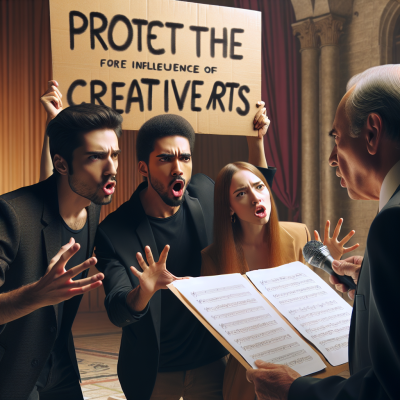
UK Music Legends Rally Behind Amendment to Protect Artists from Unchecked AI Use
In a significant cultural and political moment, British music legends such as Robbie Williams, Sir Tom Jones, and Dame Shirley Bassey have joined a growing chorus of prominent voices calling for stronger protections for artists from artificial intelligence (AI). Their collective message to the UK government: creatives deserve transparency and control when it comes to how their art is used by emerging AI technologies.
AI and the Arts: A Growing Concern for Creatives
The landscape of creative industries is shifting rapidly due to AI’s ability to replicate and remix artistic works. From realistic music generation to visual art reproduction, AI tools are utilizing vast amounts of creative content—often without the knowledge or consent of the original artists. This development has sparked widespread concern across the entertainment and artistic communities.
The crux of the issue lies in the lack of legal requirements for AI developers to disclose the use of copyrighted or creative work during the training and output phases. As a result, artists fear that their unique styles, voices, and identities can be co-opted by developers without compensation or recognition.
What the Proposed Amendment Aims to Achieve
The amendment backed by Williams, Jones, Bassey, and an array of other creatives, aims to instill a necessary layer of transparency and accountability into AI innovation. Under this proposed change, AI companies would be legally required to inform artists if their work has been used in the development of AI models.
This includes:
- Music recordings and compositions
- Lyrics and written works
- Voice samples and sound signatures
- Visual art, film, and photography
Advocates argue that such legislation would help preserve the economic rights, artistic integrity, and cultural contributions of UK artists in a rapidly evolving technological environment.
Celebrity Support Signals Urgency
High-profile support for the amendment adds gravitas to the issue. Robbie Williams, whose vocal stylings and songwriting have defined decades of British pop, spoke out about the risks of AI “stealing the soul” of music without respect for its creators. Sir Tom Jones, known for his genre-defying hits and enduring presence in the music industry, emphasized the need for artists’ recognition in a world where digital replicas may take center stage.
Dame Shirley Bassey, whose iconic voice has come to symbolize an era of British performance, expressed her concern about technology being used to mimic and exploit artists who have spent lifetimes honing their craft. Their calls for support reflect a deep anxiety about the cultural consequences of unregulated AI usage in the arts.
Starmer and Labour’s Position on AI and Creative Rights
Labour leader Sir Keir Starmer and his party have expressed interest in addressing the rapid expansion of AI and its impact on workers across industries, including the arts. While concrete policy proposals remain under development, the rising celebrity-backed pressure may be instrumental in shaping the future of the UK’s legal framework on this front.
Industry insiders suggest that if Labour incorporates this amendment into broader digital rights proposals, it could mark a pivotal turning point in how the UK balances innovation with cultural preservation.
The Broader Implications: Culture, Authenticity, and Trust
This ongoing debate is about more than just AI regulation—it’s a matter of cultural identity, trust, and ethical technology development. The music, words, and voices of legendary artists form the foundation of Britain’s global cultural legacy. When these elements are used by AI without consent, there’s not only a loss of ownership but also a dilution of authenticity in the arts.
Key questions echo through this debate:
- How do we preserve the uniqueness of human creativity?
- When does AI use cross into exploitation?
- What are the moral responsibilities of AI developers and platforms?
The Path Forward: Artist Rights in the Digital Era
The momentum generated by some of Britain’s most celebrated artists signals a broader cultural awakening. As AI becomes more powerful and pervasive, finding smart, fair, and ethical ways to integrate it into our society is essential. Artists are not anti-technology—they are asking for fairness, transparency, and respect.
Ahead of forthcoming policy decisions, creatives and civil rights organisations are urging Parliament to adopt the proposed amendment, which would ensure AI is developed alongside a robust framework that puts creators at its center—not in its shadow.
Conclusion: Music, AI, and a New Era of Coexistence
This movement represents not just a legal battle, but a philosophical one. As the United Kingdom continues to position itself at the forefront of tech-driven innovation, ensuring that technological progress upholds human creativity will be the litmus test of its ethical responsibility.
Supported by voices like Robbie Williams, Tom Jones, and Shirley Bassey, this growing initiative hopes to redefine the terms of engagement between artists and artificial intelligence. For creators, it’s a fight for their voice—literally and figuratively.


Leave a Reply